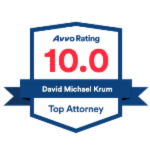





Financial Crimes
The Virginia Code contains a number of financial crimes, including:
Embezzlement
In Virginia, the crime of embezzlement is distinguished by the scenario of money or personal property being entrusted to a person pursuant to that person’s employment or to deliver or keep for anyone else. It is not only taking the property of another – the taking must also be an abuse of trust, due to the relationship between the defendant and the person who gave the property to them.
Extortion: This crime is when an individual obtains or tries to obtain a financial benefit by threatening to inflict or actually inflicting harm upon another.
Forgery (also called “uttering”)
Forgery is defined as making a false writing which, if genuine, would have some legal effect to the detriment of another person.
Identity Theft
It is a crime in Virginia to obtain money, credit, loans, goods, or services using the identifying information of another person; obtain identification documents in another person’s name; obtain, record, or access identifying information while impersonating a law enforcement or government official; and/or to obtain, record, or access identifying information not available to the general public that would assist in accessing financial resources, obtaining identification documents, or obtain benefits of such other person. Identity theft is a misdemeanor if it results in a financial loss of less than $1,000 and is a class 6 felony if it results in a financial loss of $1,000 more. There are additional gradations in the class of the felony and the potential punishment depending on the specifics of the allegations.
Issuing Bad Checks
Passing a bad check in Virginia, in order to be a crime, must be done with the intent to defraud. The person must know at the time they pass the check that they don’t have sufficient funds or credit to pay the amount of the check. If the amount on the check is less than $1,000, it is a misdemeanor and if the amount is $1,000 or more, it is a class 6 felony.
Larceny
In Virginia, larceny is the taking of the property of another with the intention to permanently deprive the other person of that property. The law distinguishes between petit and grand larceny. Petit larceny is a misdemeanor that applies when the value of the property in question is less than $1,000. Grand larceny is a felony and applies when the amount of the property is $1,000 or more.
Obtaining money by false pretenses
This crime refers to obtaining money or other property from another by lying or making other false representation. It is a class 4 felony punishable by two to ten years of incarceration and a fine of up to $100,000.
Financial crimes often require the prosecutor to obtain and present a great deal of technical evidence in court, including records and the testimony of many people who may live in other parts of the United States. It takes a skilled and experienced prosecutor to successfully prove financial crimes in Virginia, and the defense attorneys at Krum Gergely & Oates can fight for you or a loved one who is facing such a charge.


